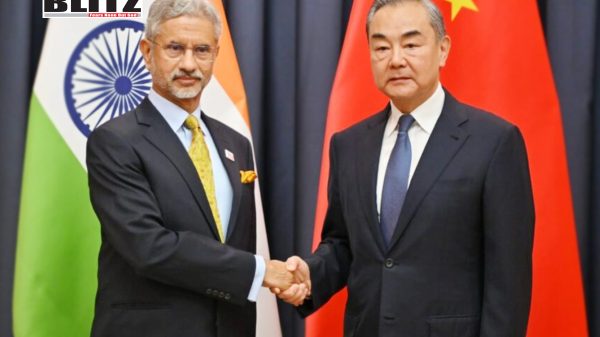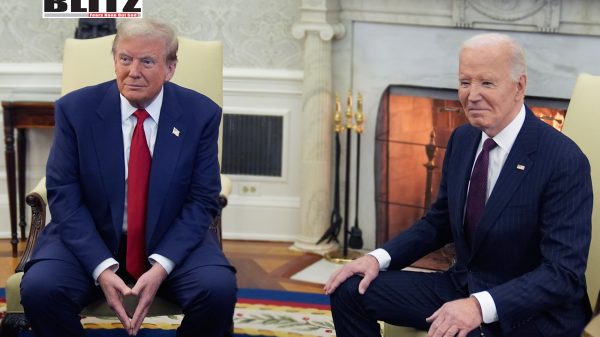India and China should focus on consensus not differences
- Update Time : Saturday, November 23, 2024

Recent diplomatic engagements between China and India have brought renewed focus on the importance of fostering consensus rather than allowing differences to dictate the trajectory of their bilateral relations. The meeting between Chinese Foreign Minister Wang Yi and Indian External Affairs Minister Subrahmanyam Jaishankar in Rio de Janeiro, Brazil, has been lauded as a significant step forward. This dialogue, the first official talks since the disengagement of military forces at two key friction points along their shared border, reflects a growing commitment to stability and cooperation.
The recent surge in high-level interactions between China and India has provided a roadmap for improving bilateral ties. Notably, the October 23 meeting between Chinese President Xi Jinping and Indian Prime Minister Narendra Modi on the sidelines of the BRICS Summit in Kazan, Russia, marked an important milestone. Both leaders underscored the need for a stable and constructive relationship, reaching a consensus on improving and developing their nations’ ties.
Jaishankar’s remarks during the Rio meeting echoed this sentiment, emphasizing that the areas of consensus between the two nations far outweigh their differences. He stressed the importance of adopting a strategic perspective and a positive attitude in handling bilateral issues. These comments highlight the recognition that despite persistent challenges, a cooperative relationship is not only desirable but essential for both nations.
India has compelling reasons to seek stronger relations with China. Prime Minister Modi’s vision for a “New India,” centered on robust national development, hinges on a stable internal and external environment. Rising global uncertainties make a sound relationship with China critical to India’s core interests.
China’s economic prowess, as the world’s second-largest economy, makes it an influential player in India’s external environment. Beyond geopolitical considerations, China’s role in facilitating India’s economic growth and long-term development is undeniable. The burgeoning trade relationship, even amid past tensions, underscores the mutual economic benefits.
However, India faces a delicate balancing act. The United States and Western allies have been courting India as part of their broader strategy to counter China. While this has strategic appeal, India has shown restraint, adopting a cautious stance to avoid becoming overly entangled in power dynamics that might undermine its interests.
A healthy China-India relationship has implications that extend far beyond the bilateral sphere. As Jaishankar highlighted, both nations are pivotal players in global affairs. Their cooperation could reshape international dynamics, offering an alternative to Western hegemony.
China and India’s collaboration within multilateral frameworks such as the G20 and BRICS is particularly noteworthy. Their joint efforts can help establish a more balanced world order, advancing the interests of the Global South. Effective management of their differences would not only benefit the two countries but also contribute to global stability and equitable development.
For China-India relations to achieve greater stability, it is imperative for both governments to prioritize dialogue and practical cooperation. Foreign Minister Wang Yi’s proposals during the Rio meeting outline actionable steps, including resuming direct flights, easing visa procedures, and facilitating the exchange of journalists. These measures would enhance cultural and personnel exchanges, fostering mutual understanding and goodwill.
Economic collaboration remains a cornerstone of their relationship. Strengthening trade ties, addressing tariff issues, and exploring joint ventures in technology and infrastructure could provide a foundation for sustained partnership. Additionally, joint efforts in combating climate change and advancing regional development could reinforce shared objectives.
The recent military disengagement at friction points along the border demonstrates the potential for resolving contentious issues through dialogue and negotiation. Maintaining open channels of communication, particularly in areas of security and defense, will be crucial to preventing future escalations.
While the trajectory of China-India relations appears promising, the path ahead is not without obstacles. Historical grievances, border disputes, and mutual suspicions have long complicated their relationship. The Galwan Valley clashes of 2020 remain a stark reminder of the fragility of trust between the two nations.
India’s concerns over China’s growing influence in South Asia and its close ties with Pakistan add another layer of complexity. Similarly, China has reservations about India’s participation in the Quadrilateral Security Dialogue (Quad), which it perceives as a US-led initiative to contain China.
Addressing these challenges requires sustained effort and genuine commitment from both sides. India, in particular, must navigate its foreign policy with a focus on consensus-building. While it is natural to have differences, allowing them to overshadow areas of agreement would be a disservice to both nations.
The success of these efforts will depend largely on the sincerity of both parties. China has consistently expressed its willingness to strengthen ties, but India’s approach will be equally decisive. A cooperative stance, free from the influence of external powers, will be key to building mutual trust.
India’s leadership must also resist domestic political pressures that may favor a hardline approach. Instead, fostering a narrative that emphasizes shared interests and mutual benefits can help create an environment conducive to cooperation.
The recent diplomatic engagements between China and India signal a potential turning point in their bilateral relations. By focusing on consensus and constructive dialogue, the two nations can pave the way for a more stable and productive relationship.
For India, the path to “New India” lies not in conflict but in collaboration with its neighbors, including China. Similarly, China stands to benefit from a stable partnership with India as it pursues its own development goals and global aspirations. Together, these two Asian giants can play a transformative role in shaping a more balanced and equitable world order.
Ultimately, the momentum for improvement in China-India relations hinges on the willingness of both nations to prioritize consensus over differences. This approach is not only in their mutual interest but also essential for fostering peace, stability, and prosperity on a global scale.















Leave a Reply